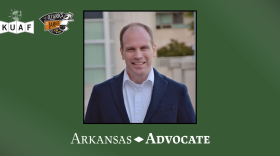The Winthrop Rockefeller Institute is launching a new initiative called Civic Arkansas. The idea is to amplify civic engagement across the natural state. Janet Harris serves as the Executive Director and CEO of the Institute. She says it's important to remember that civic engagement is more than just voting in politics.
Janet Harris: And voting is very important. But it's not the only way in which we can own the future of our community.
Matthew Moore: What motivated the Winthrop Rockefeller Institute to examine civic engagement in Arkansas?
JH: Our roots in civic engagement really go back to 1971 when Governor Winthrop Rockefeller was giving his farewell address to the General Assembly and to the citizens of Arkansas, and he was talking to them about his hopes for the future of our state, and how we might build that future together. And the thing that he said that we continue to be mindful of today, 50 plus years later, is that every citizen has a duty to be informed, to be thoughtfully concerned and to participate in the search for solutions. And then he counseled us that only by working together can we make the contribution that we must make to build that future that we want to see. That sort of philosophy underlies everything that we do at the institute to convene people to talk about issues that are important to Arkansas and more importantly than talking try to arrive at solutions collaboratively by working together. From that ethos, we had a partnership develop with the Clinton School of Public Service and Engage Arkansas, along with the Central Arkansas Library System. And what we decided to do together was to examine how well we're doing in Arkansas on those three things: being informed, being thoughtfully concerned, and participating in the search for solutions, which we think of as civic health more broadly.
Based on the research and the work of the Clinton School of Public Service, their authors and writers, and also the National Conference on Citizenship, who kind of helps states determine how well they're doing in the civic health space, we produced a report called The Arkansas Civic Health Index Report. This is the first one that has ever been done in the state. So we're really excited to have some metrics now to know how well we're doing with our civic health.
MM: Can you give me a little bit more about some specifics that this report showed us?
The Arkansas Civic Health Index looks at voter registration, voter turnout, whether or not we talk with our elected officials, whether or not we donate to political campaigns, that tells us how well we're kind of involved in the political process. But it also looks at things like where we get our news, and whether or not we trust our neighbors, whether or not we volunteer, whether or not we give to those organizations that are kind of you know, nonprofits, charitable organizations that are out trying to make a difference in our community. It's whether or not we can have civil conversations about politics with our neighbors and do we talk about politics and do we talk about issues that are important to our community. So, social connectedness is a piece of what the Arkansas civic health index report measure.
And what I'm what I want to be sure that people know is that yes, Arkansas is 51st in voter turnout and voter registration in the country. So, we are at the very bottom and that's something we absolutely want to work on. But there's some good news in the report too —and I think not no Arkansan will be surprised by this — we're a small state. We know each other pretty well. We like our neighbors. We're friendly, we're connected with each other. And we do very well when it comes to charitable giving in this state. So Arkansans are generous, they're warm, they enjoy being in community. We like to talk to each other. It's just that in the last several years, we've kind of stopped talking to each other about politics and issues and we are not as participatory in volunteering as we should be.
Civic health is really the fabric of everything is kind of in between government, citizens, and the business community. It’s nonprofits, it’s schools, it's how well we're educated about how our government works for us. There's just a lot of different ways that we can exercise that duty that we have that Winthrop Rockefeller talked about.
MM: Let's dive in a little bit into what Civic Arkansas is and what is kind of more specifically the the mission and drive of this project that you guys are launching.
JH: The mission of Civic Arkansas of the program, — and again, it's going to be sort of underpinned by the Arkansas Civic Health index reports, we have these findings and recommendations to go on — but the mission really is to leverage the strengths that we have in Arkansas. Those things I talked about with connectedness and friendliness and how well we give how generous we are, we want to leverage those strengths to address the weaknesses that are in the report. Things like voter turnout, attending public meetings, talking with elected officials, volunteering, we want to know how we can strengthen those avenues for Arkansans to get involved.
And the way that we're going to know that is to do what we do here at the Institute which is practice the Rockefeller Ethic: bringing diverse viewpoints together and respectful dialogue and asking us all to work together to solve this problem.
MM: So is the hope that these avenues can be ways to bring forward more productive results in the places where we're struggling and kind of maybe more specifically, like what would a listening session look like? What could someone maybe look forward to?
JH: Oh, that's great question. As a society, I think we've become a little reluctant to talk about politics because sometimes we get into these heated discussions, right. And we are very polarized as a country. I think that anyone who watches the news can tell you that, but the Institute and many other public engagement organizations across the state are dedicated to creating a space for people to be able to express their own experiences, their own values, and their own opinions, without judgment and without conflict.
I mean, yes, you may disagree with someone, but there's a way to do that respectfully. And there's a way to do that without being disagreeable. And so, our listening sessions and our work that we've done across the state really on a variety of issues, to invite people to the table to have their viewpoints shared and discussed, always creates a structure and a process that allows for equal participation, but also ensures that that respectful dialogue takes place. And when you have the opportunity to hear from people about why they may feel a particular way about an issue. It causes you to understand them better. And so mutual understanding is a big part of this, even if we don't agree at least we understand the things that we share in common and the common future that we want to build together. And that's always been true about our democracy. So what we're hoping is that we can revive some of that by creating a space that maybe you're not comfortable talking about politics at the Thanksgiving table, but you are comfortable coming into this space and your community decide this is what I want to see for the future. And this is how I sort of see it happening from my perspective.
MM: One of the things I keep hearing from you over and over again is this motivation to work together and to come up with solutions and compromises to make Arkansas better. And I hope that that's part of your drive here as well, right?
JH: Absolutely. In our mission, we talk about continuing Governor Rockefeller’s collaborative approach to creating transformational change and we're inspired by his history of having done that bringing people to Petit Jean Mountain when he was governor, you know, he was a Republican governor with a mostly — and I'm saying almost all — Democratic legislature, and yet he wanted to bring them to the mountain to sit down and say, ‘Where can we agree where can we work on things and move forward together?’ And personally, I don't think that's an antiquated idea. I think that is just as important today, in 2024, as it was when he was governor. And so, yes, that is very much a part of what we try to foster and promote is collaborative problem solving.
We know that disagreement is part of our democracy is part of our republic. It's part of what makes our governments so important, is the notion that we can come together with different ideas and still manage to work together, and we want to hear from Arkansans about how we can support that. Those of us who are out there, putting these conversations together, trying to help people register to vote or understand issues about what's on the ballot and who's on the ballot. We want to know how we can make that process easier and get more people involved.
MM: Is there anything I missed, Janet? Or anything you want to make sure we touch on with this specific topic?
We talked about being informed being thoughtfully concerned and participating in the search for solutions. So I would be remiss if I didn't give you a couple of things that your listeners can do to do those things, right?
The first invitation I would make is for your listeners to visit our website. If you go to that website, you'll be able to fill out a form. You don't have to give us a lot of information, we just want to know how to reach you and keep you informed about listening sessions and opportunities to participate in civic Arkansas. You can read the civic health index report if you want to know more about these numbers that we discussed. You can also you know kind of follow the progress of what we're learning as we go through this next year. And if you go to our website and you sign up you can expect to hear from us about opportunities how, where you can participate.
And then the other thing I would just say is to take a look at the report and think about what it is that your role your role — your listeners role — is in civic participation. Whether it's how you get your news, how you get informed about issues, how you talk to your elected officials or your neighbors about politics. We all have a responsibility and we all do care about very specific things in our community. So, if you're unsure about how to volunteer or get involved with an organization that creates positive change, take a look around your community. Take a look around in places that you can be with your neighbors —whether you agree or disagree — in creating that shared positive future.
And then the final thing I would say this is election year. If you're not registered to vote, there's plenty of time to go and get registered to vote. Your vote makes a difference. The Arkansas Secretary of State has a wonderful, lots of tools for you to check your voter registration, see what's on your ballot. So, go out and make sure that when the primary and the general elections come around this year, that you are one of those citizens who's ready to be thoughtfully concerned and go to the polls.
Ozarks at Large transcripts are created on a rush deadline by reporters. This text may not be in its final form and may be updated or revised in the future. Accuracy and availability may vary. The authoritative record of KUAF programming is the audio record.








